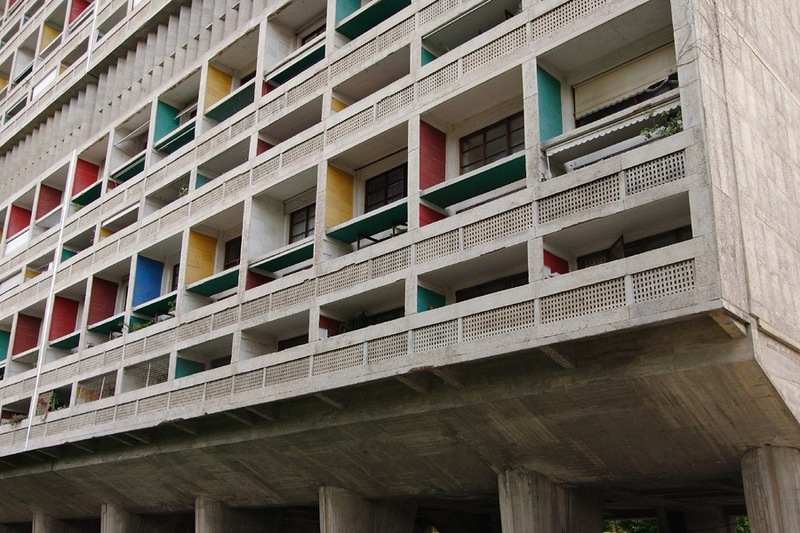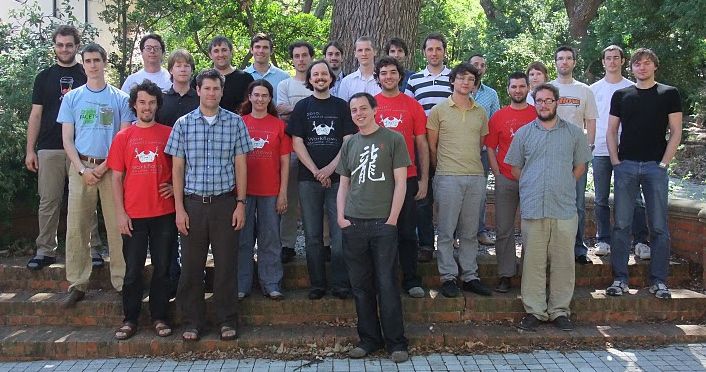FACETS CodeJam Workshop #4
22nd-24th June 2010, Marseille, France

la Cité Radieuse, Le Corbusier's vision of a high-rise residential building as a "vertical city" in Marseille. Image by Dom Dada (Creative Commons Licence)
The goal of the FACETS CodeJam workshops is to catalyze open-source, collaborative software development in computational and systems neuroscience and neuroinformatics, by bringing together researchers, students and engineers to share ideas, present their work, and write code together. The general format of the workshops is to dedicate the mornings to invited and contributed talks, leaving the afternoons free for discussions and code sprints.
For the 4th FACETS CodeJam, the main theme of the meeting was workflows: what are the best practices for combining different tools (simulators, analysis tools, visualization tools, databases etc.) to ensure the efficient and reproducible flow of data and information from experiment conception to publication and archiving?
Organization
The meeting was held at the International Center for Mathematical Research, located in Marseille, France. The meeting was organised by Andrew Davison, Abigail Morrison, Eilif Muller and Laurent Perrinet.
Participants
- Erik Anderson4
- Javier Baladron6
- Thierry Brizzi1
- Hugo Cornelis
- Andrew Davison1
- Diego Fasoli6
- Samuel Garcia7
- Mike Hull8
- Florent Jaillet3
- Sebastian Jeltsch9
- Philippe Katz3
- John Kenyon
- David Koop
- Susanne Kunkel10
- Michele Mattioni11
- Abigail Morrison12
- Simon Moré16
- Anthony Mouraud5
- Eilif Muller2
- Eric Müller9
- Laurent Perrinet3
- Laurent Pezard13
- Philipp Rautenberg14
- Raphael Ritz15
- Paula Sanz Leon3
- Tom Schaul17
- Andrey Sobolev14
- Sylvain Takerkart3
- Gaël Varoquaux
- Liang Wang
- Bernd Wiebelt10
- Sarah Wirtssohn3
- Pierre Yger1
- Yury V. Zaytsev10
- 1UNIC, CNRS, Gif sur Yvette, France
- 2Laboratory of Computational Neuroscience, EPFL, Lausanne, Switzerland
- 3INCM, Marseille, France
- 4SCI Institute, University of Utah, Salt Lake City, UT, USA
- 5INRIA Saclay, Orsay, France
- 6Neuromathcomp Group, INRIA, Sophia Antipolis, France
- 7Université Claude Bernard Lyon 1, France
- 8Institute for Adaptive and Neural Computation, University of Edinburgh, Edinburgh, UK
- 9Kirchoff-Institut für Physik, Ruprecht-Karls-Universität, Heidelberg, Germany
- 10Bernstein Centre for Computational Neuroscience, Albert-Ludwigs-Universität, Freiburg, Germany
- 11EMBL-EBI, Hinxton, Cambridge, UK
- 12Diesmann Research Unit, RIKEN, Japan
- 13LNIA - UMR 6149 - CNRS, Université de Provence, Marseille, France
- 14Ludwig-Maximilians-Universität, Munich, Germany
- 15INCF Secretariat, Stockholm, Sweden
- 16Laboratoire Neurobiologie Cognitive, Marseille, France
- 17IDSIA, Lugano, Switzerland

Meeting Program
Tue. 22nd June | ||
| 08:30 | Session 1 | |
| 08:30 | Laurent Perrinet | Welcome |
| 08:45 | Gaël Varoquaux | Analyzing and modelling spontaneous brain activity in neuroimaging with Python [PDF] |
| 09:30 | David Koop | VisTrails: Using Provenance for Scientific Exploration through Workflows |
| 10:15 | Coffee Break | |
| 11:00 | Session 2 | |
| 11:00 | Michele Mattioni | Sumatra and Neuronvisio. Run, Store, Search, Locate and Reload simulations' results [ODP] |
| 11:30 | Mike Hull | Morphforge - Biophysical Simulation In Python [PDF] |
| 12:00 | Tom Schaul | PyBrain: a machine learning perspective on neural networks and learning tools [PPTX] |
| 12:30 | Lunch | |
| 14:00 | Code sprints, tutorials and discussions | |
| 20:00- | Banquet | |
Wed. 23rd June | ||
| 09:00 | Session 3 | |
| 09:00 | Raphael Ritz | INCF Digital Atlasing Infrastructure Initiative |
| 09:45 | Hugo Cornelis | GENESIS 3/Neurospaces |
| 10:30 | Coffee Break | |
| 11:00 | Session 4 | |
| 11:00 | Philipp Rautenberg and Andrey Sobolev | Development of tools for neurophysiology data management and sharing at the German Neuroinformatics Node [PDF] |
| 11:30 | Lightning Talks | |
| 11:30 | Samuel Garcia | NEO : base and integration in OpenElectrophy [PDF] |
| 11:50 | John Kenyon | PLY (Python Lex-Yacc) |
| 12:10 | Anthony Mouraud | Spiking Neuron Networks Distributed Simulations with DAMNED [PDF] |
| 12:30 | Lunch | |
| 14:00-18:00 | Code sprints, tutorials and discussions | |
Thu. 24th June | ||
| 09:00 | Session 5 | |
| 09:00 | Mihai Petrovici | Neuroscientific modeling with large-scale and highly accelerated neuromorphic hardware devices: methods, problems and perspectives [PDF] |
| 09:45 | Erik Anderson | Using VisTrails to Analyze and Visualize MRI and EEG Data |
| 10:30 | Coffee Break | |
| 11:00 | Session 6 | |
| 11:00 | Andrew Davison | What's new with PyNN, what's new with Sumatra? [PDF] |
| 11:30 | Lightning Talks | |
| 11:30 | Laurent Perrinet | Hooking together the pieces to build a neuroscience demo [link to slides] |
| 11:50 | Sebastian Jeltsch | The WAF build system [PDF] |
| 12:10 | Eilif Muller | Working with neuroscience ontologies using Python & rdflib [PDF] |
| 12:30 | Lunch | |
| 14:00-18:00 | Code sprints, tutorials and discussions | |

Unless mentioned otherwise, all the downloadable talks are licenced under a Creative Commons Attribution-Noncommercial-No Derivative Works License.
Support
The meeting organizers gratefully acknowledge the support of the European Union through the FACETS Project (grant no. IST-2005-15879), and the International Neuroinformatics Co-ordinating Facility (INCF). We also wish to express our great appreciation to the DyVA team at the Institut de Neurosciences Cognitives de la Méditerranée for providing us with a great location and much assistance.